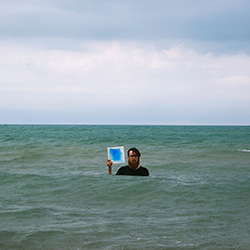
How do we come together in the wake of the ongoing COVID-19 pandemic?
What forms of literature, music, theory, & visual art will facilitate the forms of community we need?
This symposium explores how to engage with the forms of suffering the COVID-19 pandemic has made visible on a global scale, alongside its multiplying aftershocks and afterlives—from economic instability to the War in Ukraine.
---------------------------------------------------------------------------------------
Day Two: Corey D. Smith performs first part of "MIDWAY—A Performance Lecture"
Zoom: https://asu.zoom.us/j/86907313768
7am (MST) / 9am (CDT): GRAY SOUND: Corey D. Smith performs first part of "MIDWAY—A Performance Lecture," a musical and performance art piece commissioned as part of this Myers Foundations symposium.
Smith's piece engages with Frank Lloyd Wright's "Midway Gardens," a former concert/entertainment venue on the South Side of Chicago that was demolished in the aftermath of the 1918 Pandemic and 1929 Financial Crisis.
---------------------------------------------------------------------------------------
Events associated with Never Not in Crisis take place in the Chicago area, Wednesday and Thursday, October 26 and 27, and in the Phoenix area, Saturday, October 29.
The symposium is organized by Jacob Henry Leveton, Program Coordinator of the Institute for Humanities Research at Arizona State University, and Tamar Kharatishvili, PhD Candidate in the Department of Art History at Northwestern University.
We are grateful to acknowledge the funding and logistical support of the Myers Foundations, the Weinberg College of Arts & Sciences, the Department of Art History, the Department of Anthropology, the Chabraja Center for Historical Studies, the Department of History, the Department of English, the Department of French and Italian, the French Interdisciplinary Group, the Department of German, the Program in Comparative Literary Studies, the Program in Environmental Policy and Culture, the Department of Philosophy, and the Science in Human Culture Program, at Northwestern, and the Gray Center for Arts and Inquiry at the University of Chicago.
For questions about the symposium, please contact:
Jacob Leveton, Program Coordinator, Institute for Humanities Research, Arizona State University
JLeveton@asu.edu
Audience
- Faculty/Staff
- Student
- Public
- Post Docs/Docs
- Graduate Students
Interest
- Academic (general)
- Arts/Humanities